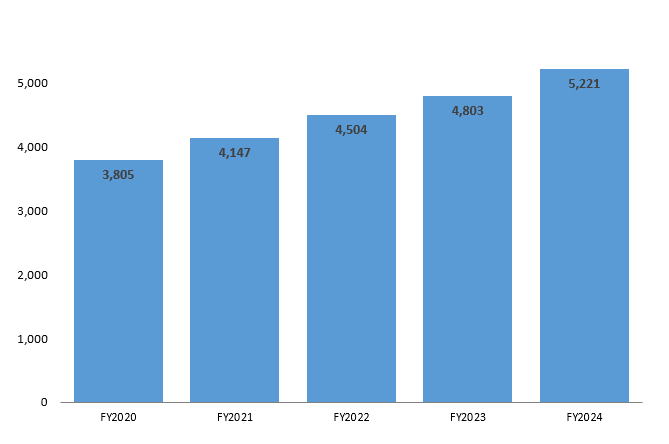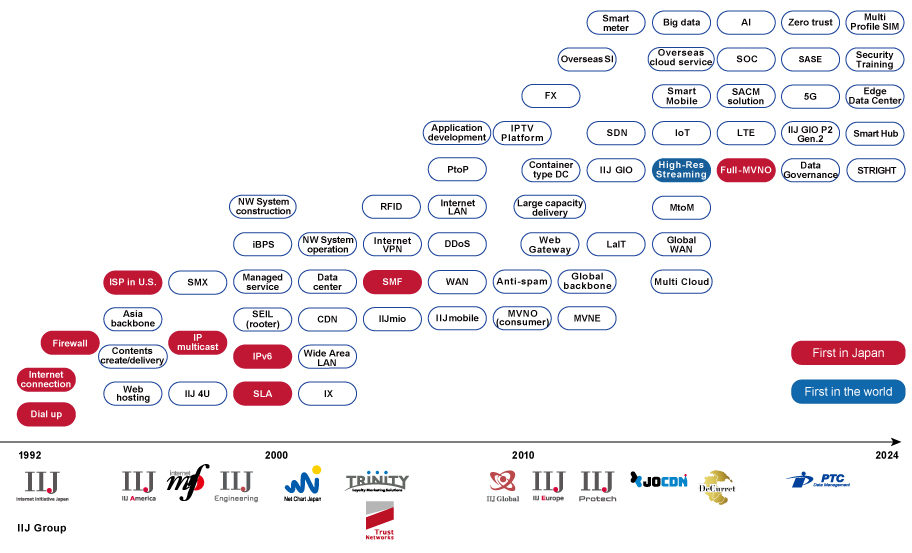Top of Page
- Links to move inside this page.
- HOME
- Investor Relations
- Integrated Report Portal
- Human Capital
Human Capital
Basic Approach to Human Capital
IIJ Group has been supporting the development of Internet in Japan by leading technological innovation, developing highly value-added services ahead of competitors, and continuously ensuring the stable operation of these services in line with its management philosophy. As the scope and scale of IT utilization among Japanese enterprises and government agencies continue to expand with the recent trend toward DX (Digital Transformation), IIJ Group's role of providing network systems is expected to become further important in the future. IIJ Group recognizes that the foundation for fulfilling this role is human resources, and continuous acquisition and training of skilled engineers are highly important for further growth. Since its inception, IIJ Group's engineers have been continuously honing their expertise through their assignments and business opportunities such as constructing and operating large-scale networks, servers, and data centers, developing and operating various network services including Internet access, cloud computing, MVNO (Mobile Virtual Network Operator) and IoT, and engaging in the pursuit of Internet-related technologies, which have led to the accumulation of technical capabilities and business growth. As IIJ Group is still in the midst of growth, it believes that opportunities for new challenges are expected to increase with the expansion of business and technological domains in the future. IIJ Group shall continue to hire and train aspiring individuals who aim to achieve self-fulfillment through these opportunities, and further enhance employee engagement by appointing and promoting employees based on their abilities, and reflecting their individual roles and contributions in their evaluation and compensation, irrespective of gender, age, nationality, disability, or other attributes.
IIJ conducts an employee survey on their awareness. Its overall satisfaction level (*1) has remained high, and turnover rate (*2) has stayed in lower than the industry average.
IIJ (non-consolidated basis) Employee Survey - Overall Satisfaction
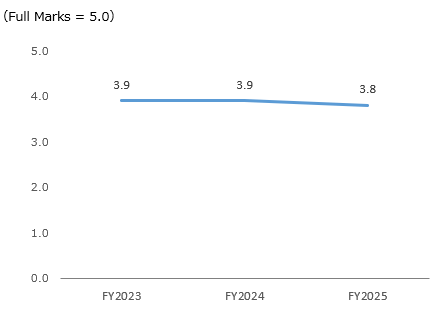
IIJ (non-consolidated basis) Turnover rates

- (*1)The Employee Survey is an annual engagement survey (approximately 50 questions), and each item is rated on a five-point scale: 1 (disagree), 2 (somewhat disagree), 3 (neutral), 4 (somewhat agree), and 5 (agree). The "Overall Satisfaction" is the result of a question, "I am satisfied overall."
- (*2)The turnover rate is the percentage of full-time employees employed at the beginning of the period who left during the period. According to the "Survey of Employment Trends in the Information and Communications Industry" by the Ministry of Health, Labor and Welfare, the industry average is around 10%.
Policy for Human Resource Acquisition
IIJ Group's human resource strategy is based on the policy of continuous hiring and training new graduates as main resources which is complemented by mid-career hires as professionals. As the first full-scale Internet service provider in Japan, IIJ is highly recognized by students and engineers who would like to pursue Internet-related technologies. Therefore, IIJ has increased the number of new graduate hires both on a non-consolidated and consolidated basis, even in the recent competitive IT engineer recruitment market. With regard to new graduate recruitment, the ratio of engineers on a non-consolidated basis is approximately 70%, of which the ratio of doctoral or master's degree holders is approximately 40%. As a program to recruit new graduates, IIJ provides practical internship opportunities in technical departments (network, cloud, security, IoT, and others) to have early contacts with aspiring students who hope to become engineers, in which it promotes efforts to make these students aware of growth opportunities through their jobs. Since IIJ recognizes that continued expansion of human resources is necessary for further business growth, it has increased the number of new graduate hires to 215 on a non-consolidated basis and 307 on a consolidated basis in FY2024, and plans to continue focusing on recruitment going forward.
IIJ Group Number of New Graduate Hires
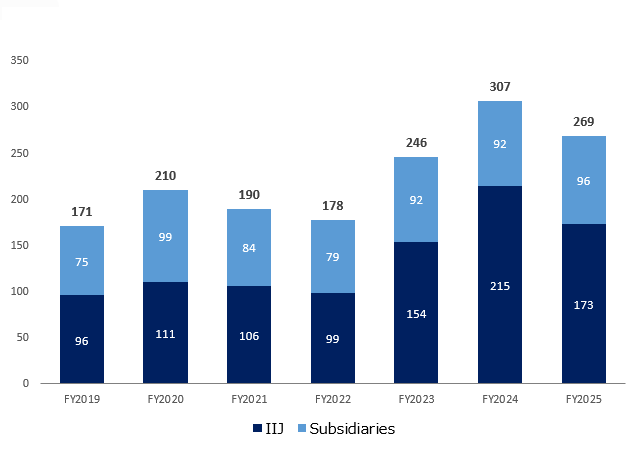
Policy for Human Resource Development
Human resource development is primarily based on on-the-job training (OJT) through assigned duties, which is supplemented by layer-specific trainings based on the employees' grades and roles, and department-specific trainings for the purpose of acquiring expertise and skills. IIJ Group believes that providing job opportunities such as the construction and operation of Internet backbone, which is one of the largest in Japan, and in-house development and operation of innovative services, attracts and motivates aspiring engineers. As sales staff need to have technical knowledge relating to networks and systems, IIJ provides basic technical trainings, IIJ service understanding trainings, and service comprehension tests to help them learn and retain such knowledge, which complement OJT through sales activities. There are seminars held by sales departments to share top performers' sales approaches and successful proposals, which support many of sales staff with liberal arts backgrounds to perform well.
IIJ's new graduates are educated on their duties by managers. In addition, they set capability development goals with non¬supervisory superiors who have taken an OJT trainer training, which takes into account their individual characteristics and preferences, and receive advice and support throughout an entire year to enable them to independently perform their duties in the early stages of careers. Since 2018, approximately 100 employees have newly taken the OJT trainer training each year, and the number of experienced trainers has been increasing year by year. IIJ believes that the increase in these trained employees will lead to an enhancement in the company-wide OJT level.
OJT Trainer System

IIJ recognizes that the development of young employees is highly important. Therefore, IIJ considers the results of the annual employee awareness survey on "Challenge," "Self-Growth," and "Managers' Support" (*3) among young employees to be important indicators of whether the OJT is functioning effectively. IIJ has been making efforts to improve them by analyzing the results of these assessments so that the overall scores for these indicators would be in the upper three-point range or higher, and this will continue in the future.
IIJ (non-consolidated basis) OJT Effectiveness Indicators
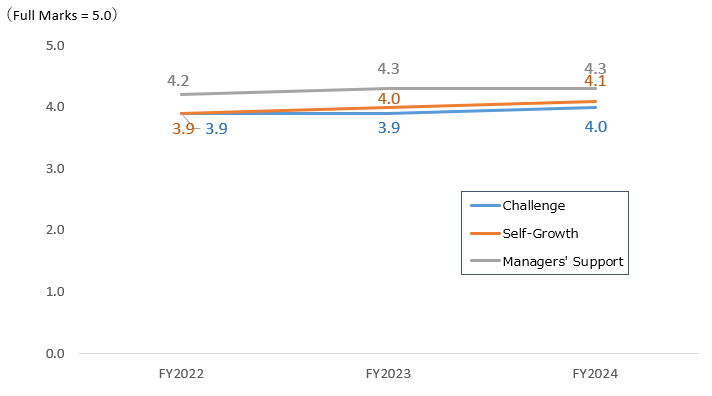
- (*3)The Employee Survey is an annual engagement survey (approximately 50 questions), and each item is rated on a five-point scale of 1 (disagree), 2 (somewhat disagree), 3 (neutral), 4 (somewhat agree), and 5 (agree). "Challenge," "Self-Growth," and "Managers' Support" are the results of questions that include the following elements.
- Challenge: Support for taking on new challenges, acceptance of new ideas and proposals, culture that encourages employees to take on re-challenges, etc.
- Self-Growth: Sense of growth in current job, growth support system, etc.
- Managers' support: Advice from managers and superiors, satisfaction with managers, etc.
IIJ supplements OJT with programs such as trainings for new graduates (basic business training for about one month, technical training for about an additional month for engineers, etc.), trainings for newly appointed managers and executives (trainings for section managers, general managers, and executives on organizational management, development of subordinates, decision making, etc.), layer-specific training (leadership and management training), expertise development (sales training, technical training, IIJ service understanding training, etc.), and global career development (overseas trainee program, global career program, etc.).
Many employees participate in workshops and trainings organized by departments (493 times in FY2023), which promote active interactions across departmental boundaries as well as autonomous capability development.
Major workshops and trainings organized by each department
| IIJ Bootcamp | Workshops for young engineers to learn practical skills by actually using tools and frameworks with the support of teaching assistants (TAs), and lectures on the backgrounds of various technologies and alternative technologies with different characteristics |
|---|---|
| Technical Training for New Graduate Hires | Workshops for new graduate engineers, led by leading internal experts in each technology and service area to provide them with the technical and business knowledge necessary to execute their duties at IIJ |
| IIJ Sales Bootcamp | A structured onboarding program for new graduate sales employees that systematically integrates input learning through classroom training and training content, practical sales activities through OJT, and evaluation of performance, with the goal of achieving the desired state and competencies within the first year of employment |
| IIJ Services Understanding Training | Basic trainings to systematically learn IIJ services' lineup, features and basic technical concepts, and industry trends relating to the services such as Internet access, cloud computing, security, and mobile/IoT |
| Departmental Training | Project management training (project planning, risk assessment and management, monitoring and control methods, etc.), IT service management training (improvement of operational quality, analysis methods for continuous operation improvement, etc.), best practices sharing sessions, etc. |
IIJ (non-consolidated basis) Number of workshops, training sessions, etc.
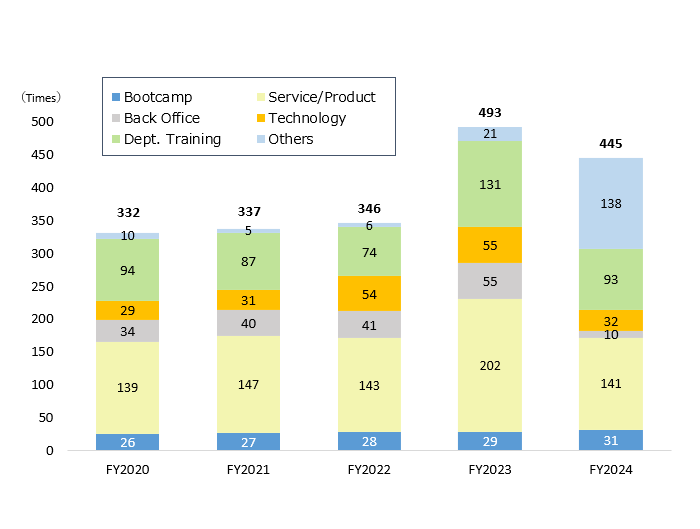
- (*) Bootcamp: Hands-on trainings for engineers
- (*) Services and products: Seminars on IIJ services and other commercial products, mainly for sales and engineers
- (*) Back office: Trainings organized by administrative departments (information security, financial accounting, etc.)
- (*) Technology: Seminars for technical knowledge and information
- (*) Departmental training (training for its own department): Professional service technical training, Sales Bootcamp etc.
- (*) Others: Lectures by external instructors, etc.
IIJ also supports career development through the "Career declaration system (*4)", the "Select job system (*5)," which is an open recruitment system for dual positions, the "Tech challenge," which allows employees to leave their assigned duties for one year to pursue new technologies or realize new service ideas, the establishment of expert positions for employees to pursue their expertise in specialized fields, and the assignment of the right people to the right roles by utilizing a talent management system.
- (*4)A system for employees to report their future career direction once a year, under which their managers and the human resources department consider development, transfers and assignments from a medium- to long-term perspective.
- (*5)Employees can apply for open positions, which departments list, ( FY2023: 61 departments participated). Through six months of concurrent duties in other departments (approx. 20% of working hours), employees can gain diverse experience by taking on challenges that they have not experienced or by executing cross-departmental missions.
Policy for Evaluation and Compensation
IIJ Group accepts a diverse range of human resources irrespective of their attributes, and appoints and promotes employees based on their abilities with respect for a variety of viewpoints and values. IIJ Group has flexibly established and reorganized its organization structure to best suit the business environment along with an increase in the number of employees due to the expansion of business scale and domain. The number of key positions has continuously increased and is expected to rise in the future. Under such circumstances, IIJ's culture, which encourages employees openly discuss regardless of their position, makes young employees to play an active role. As such, there have been cases where employees who joined IIJ as new graduates promoted to important positions such as section managers in their early 30s and general managers in their mid 30s.
IIJ (non-consolidated basis) Number of managerial positions

IIJ (non-consolidated basis) Number of Managers by Age As of Apr. 2024
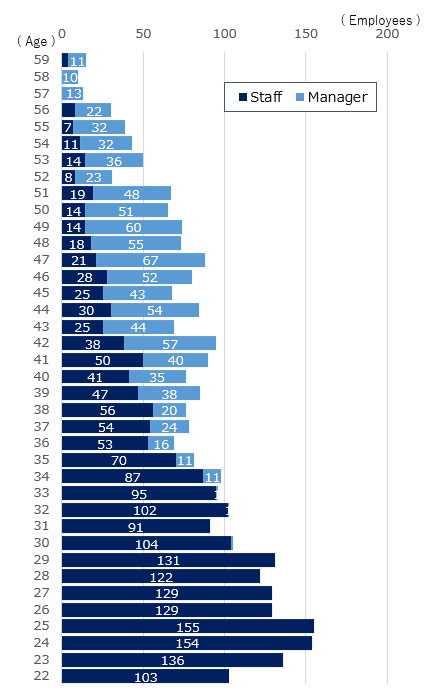
The basis of IIJ's evaluation and compensation system is employees' assigned roles and grades based on the current duties and contributions. Compensation consists of a "base salary" determined by the role and grade, and a "performance bonus" determined by semi-annual performance evaluation. IIJ Group considers its business growth and the fulfillment of employees' roles over the medium- to long-term to be important. Therefore, IIJ Group has adopted a compensation system, which mainly reflects roles and abilities, with a certain range of performance based compensation rather than overly short-term performance based compensation system. IIJ Group will maintain this system in the future.
IIJ has timely reviewed its salary level along with its business growth, in FY2023 IIJ revised new graduate hire's salaries and the salary range of existing employees (*6).
IIJ (non-consolidated basis) Pay Raise (%)

IIJ (non-consolidated basis) Average Age and Years of Service

- (*6)Revision of monthly salaries for new graduates in FY2023 (ex. Bachelor's degree holder: 256,667 yen/month, +4.8%)
Approximately 70% of IIJ Group's employees are engaged in the engineering and service departments, and many of them are recruited from universities and other institutions specializing in science and engineering, where the percentage of female is low, which has led to its characteristic of a low percentage of female employees. As IIJ's ratio of female hires including mid-careers and new graduates has been increasing in recent years, the ratio of female managers (*7) is expected to increase along with the increase in the ratio of female employees. As of April 2024, IIJ's ratio of female managers was 7.5%, and therefore IIJ has brought forward its FY2027 target of 8% or more by one year to FY2026.
IIJ (non-consolidated basis) Ratio of females in managerial positions

IIJ (non-consolidated basis) Ratio of female hires employees

- (*7)The ratios of females in managerial positions of IIJ are as of April 1 of each fiscal year
Policy for Corporate Environmental Improvement
IIJ Group has been actively working to create an environment in which employees can continue to work safely and securely with good mental and physical health, and an environment that supports the realization of work-life balance.
Well-being and mental health care
IIJ provides health checkups once a year and flu vaccinations free of charge, and has established an environment in which employees can consult with industrial physicians and public health nurses on a regular basis. In addition, IIJ conducts a stress check (*8) once a year in accordance with the Industrial Safety and Health Act. Employees who are considered to be in need of consultation due to high stress levels are interviewed with an industrial physician upon their request. The results of stress check are shared with general managers and above, so that they can take initiatives in improving the workplace environment. As part of mental health measures, IIJ also provides harassment trainings and communication trainings including anger management and assertive communication training.
IIJ (non-consolidated basis) Stress Check - Overall Health Risk
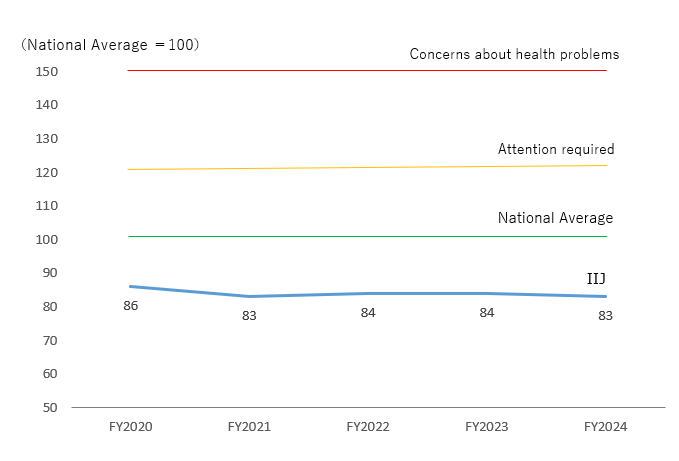
- (*8)Overall health risk is evaluated in terms of workload, support from colleagues, and other factors. 150 or higher is a level where health concerns might be apparent, and 120 or higher is a level that requires caution. The lower the value is below the national average of 100, the lower the health risk is.
Prevention of overwork and promotion of paid leave
IIJ has made a policy on working hours management and has been promoting efforts to comply with the Labor Standards Act and to ensure appropriate working hours. IIJ constantly monitors the working hours of its employees through measures such as advance application for overtime work and the preparation of overtime status reports for departments. If overtime hours exceed a certain level, the human resource department alerts concerned departments, conducts hearings with them, and arranges interviews with industrial physicians for those who work more than a certain level of hours. As for paid leaves, employees are granted special leaves such as anniversary leave (*9) in addition to annual paid leaves. IIJ ensures that employees take at least five days of annual paid leaves, not including special ones.
Average overtime per month
| FY2019 | FY2020 | FY2021 | FY2022 | FY2023 | |
|---|---|---|---|---|---|
| Average overtime per month | 21.3 | 24.7 | 28.1 | 27.7 | 26.2 |
Number of days and percentage of paid leaves taken
| FY2019 | FY2020 | FY2021 | FY2022 | FY2023 | |
|---|---|---|---|---|---|
| Average number of paid leaves taken per year (days) | 13.2 | 10.2 | 11.3 | 12.6 | 13.1 |
| Annual average acquisition rate (%) | 75.6 | 58.5 | 64.4 | 71.0 | 75.0 |
- (*)The number of days and rate of taken paid leaves above do not include special ones.
- (*9)Major special paid leaves : Check-up leave (One day a year), Anniversary leave (Two days a year), Marriage leave (Seven days), Spousal maternity leave (Three days), Child Marriage Leave (One day)
Promotion of diverse workstyle and work-life balance
Since before the emergence of COVID-19, IIJ adopted remote work, which had introduced from employees who need childcare and nursing care, satellite offices to respond to customers faster through saving travel time, and free address to activate communication as major concepts of a location-independent workstyle.
Moreover, IIJ has been actively working to create an environment that supports a balance between work and family life with respects to each employee's life stage and sense of value. As part of its efforts to improve the corporate environment, IIJ operates various systems that enable employees to balance work and family life during illness, childcare, and nursing care, such as "Childcare and nursing care leave systems," and "Private injury and illness return leave system." IIJ received Kurumin certification, awarded to companies that support childcare, from the Ministry of Health, Labour and Welfare under the Act on Advancement of Measures to Support Raising Next-Generation Children. Our goal is maintaining a 10% or greater utilization rate of the childcare leave system for male and a 90% or greater utilization rate for female employees.
IIJ also operates a flextime system, a staggered work schedule system, and a short-time work schedule system to suit employees' work characteristics and individual environments. There are measures including supports for personal financial asset building, such as the IIJ Group employee shareholding association, assets accumulation savings, and regular financial planning seminars, as well as family days to create opportunities for employees to receive an understanding from their family members regarding the workplace.
IIJ(non-consolidated basis) Ratio of employees using the childcare leave system and ratio of employees returning to work after childcare leave system (Male / Female)
| FY2019 | FY2020 | FY2021 | FY2022 | FY2023 | ||
|---|---|---|---|---|---|---|
| Ratio of employees using the childcare leave system (%) | Male | 14.7 | 26.4 | 24.6 | 33.3 | 53.5 |
| Female | 100.0 | 100.0 | 100.0 | 100.0 | 100.0 | |
| Ratio of employees returning to work after childcare leave system (%) | Male | 100.0 | 100.0 | 92.9 | 100.0 | 100.0 |
| Female | 100.0 | 100.0 | 100.0 | 100.0 | 93.3 | |
End of the page.
